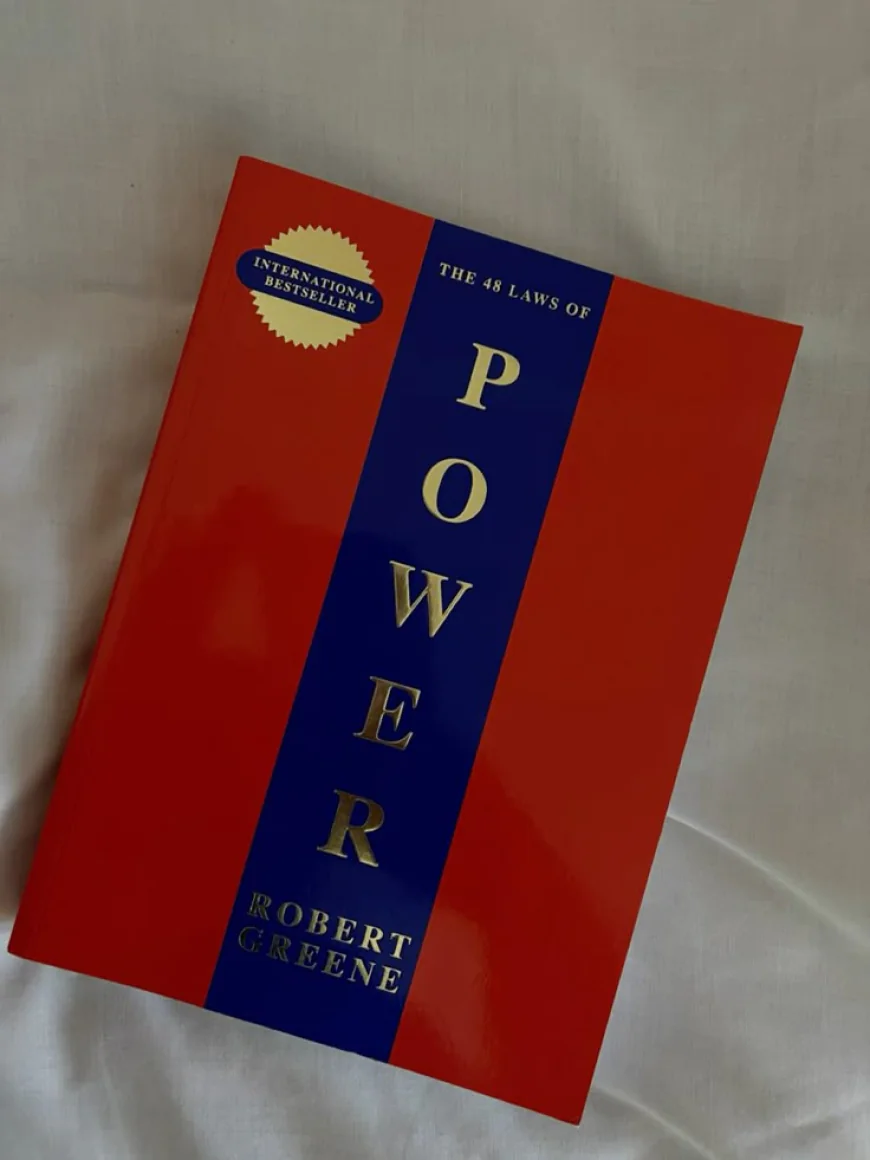The 48 Laws of Power by Robert Greene: Complete List of Laws
Robert Greene's 48 Laws of Power: Complete List. Master the laws of power by Robert Greene. Explore the 48 Laws of Power list, powerful figures.

There is no denying the impact of Robert Greene on the perception of the dynamics of the power bases. His books such as The 48 Laws of Power give an outline on how people and organizations attain power, sustain power and exercise power. The opinion of Greene, who is largely regarded as Machiavellian, goes against the traditional understanding of morality, where the readers should see the strategy behind the game of power.
Purpose of the 48 Laws
The 48 laws of power by Robert Greene are created with the aim of making a full list of power strategies in attaining and exercising power. The book of Greene does not provide any ethical guidelines but is an extensive study of the way people in power have historically acquired and held on to their power.
Through the laws, readers are able to navigate in social and professional landscapes where power dynamics are involved in a better way.
Understanding Power Dynamics
Knowledge of power relations is the key to understanding how a person can cope with the subtleties of human relationships. According to Greene, one can make better decisions and avoid being exploited by understanding how people can impose authority, manipulate images, and possess resources without the obvious.
Complete List of the 48 Laws

Law 1: Outshine No One
One of the 48 laws of power stated by Robert Greene is law number one, which is not to shine too brightly on the master. This is the strategy used to defend your place and make people respect you, not by threatening people of authority.
The basis of power is in most cases knowing the insecurities of those you are higher than and acting in a manner that removes it rather than enhances it.
Law 2: Use Enemies Wisely
Robert Greene insists that you must make use of enemies rationally, and so to destroy your enemies can be, provided it is tactfully. This legislation emphasizes that the power of hatred can make serving as a source of concentration, emphasis, and a refusal of inspiration.
The necessity to think that you will succeed in overcoming the adversity is another characteristic that drives people to great power. The 48 laws of power indicate that mercy should never be shown to them.
Law 3: Hide Intentions
It is one of the most essential laws of power of Robert Greene and it is essential to hide your intentions. Your motives are concealed and you are always at the upper hand so that no one can predict or counter your actions.
This disguise will keep you in control and have the ability to operate on the desire of people to comprehend and foresee your actions in the power game.
Law 4: Speak Less
The fourth 48 laws of power of Robert Greene is the importance of speaking less than one needs to in order to dominate people with silence as a powerful weapon. The less you say, the more you develop a sense of mystery and power.
Therefore people will be more willing to listen and even speculate on what you are about to say. The great power is seen whereby he does not disclose all the details to a more powerful person.
Law 5: Protect Reputation
Guard your reputation by all means. One of the foundations of power and influence, Greene Robert says, is reputation. Through the wise management of the way other people see you, you establish a platform of trust and respect which can be used to realize your aspirations.
Good reputation is treasure in acquisition and retention of power. In its absence, you could do well to surrender. You must be seem powerful.
Law 6: Seek Attention
Attention all costs, as is the case with Robert Greene since noticedness is essential in acquiring and retaining power. With making a spectacle or developing a distinctive personality, you will control the interest and most importantly you will be one who is of interest and influence. You do not have much power and thus you can be totally invisible. Attention is part of wielding power in its entirety.
Law 7: Take Credit
Instead, own the achievement of others, as, according to Robert Greene, perception frequently outmuscles reality when it comes to power. This tactic is featured in the 48 laws of power list, it is significant to take chances to improve your image and appear stronger that is why it is better to take the success of other people. Watch movements in credit theft.
Law 8: Make Them Come
Grow other people towards you – bait them. Robert Greene claims that it is possible to control the situation where you interact with other people to dictate the conditions under which you will engage in interaction and be at a better position. This is part and parcel of power relations. One of the strategies in this tactic can be honesty and generosity to your equals.
Law 9: Act, Don’t Argue
By your deeds conquer, not by words. According to Robert Greene, it is more effective to prove your point by action rather than having long debates. Nothing accomplishes more than visible achievements, which cement your stand and makes dissenting voices quiet.
Arguments are used by powerful people to sway other people. It may resort to the surrender tactic in case the argument is not working out.
Law 10: Avoid the Unlucky
Eschew the miserable and unlucky, since negativity is contagious and will ruin your own success, Greene says. When you dissociate yourself with people who emanate misfortune, you share your energy and sustain yourself in the right path towards realizing your objectives. A stronger person than you will disregard you most of the time when you are not a happy person.
Law 11: Create Dependence
In order to keep people in check, Robert Greene advises to make them reliant on you to retain freedom of action. This concept is one of the foundations of power dynamics and the ability of taking an advantage based on having the control over resources and expertise to warrant a position of leverage and that specific area would be indispensable.
With this strategy, you are able to have an impact on the decisions and remain in a position of power. This implies that the need of people must be in line with yours. (Learn more about power dynamics on wikipedia).
Law 12: Use Honesty Smartly
Shoot yourself in the arm with selective honesty and generous behavior since, as Robert Greene puts it, displaying kind acts and sincerity can cause the other person to relax, and thus they are more vulnerable to influence.
It is a fraudulent strategy, utilizing the temporary earnestness as the end to an end, taking advantage of people who require trust to put themselves in a superior position. The authority of others is enhanced.
Law 13: Appeal to Self-Interest
In asking assistance, address the self-interest of people, never to their kindness or thankfulness. Robert Greene points out that personal gain is the main incentive of people, and therefore the way you package your demands is the way it will benefit these people, and therefore the best response will be given.
This insight is a pillar of power and influence in interactions between human beings. Considerable power is possible under this law.
Law 14: Spy Like a Friend
Pose faithful as a friend, be a spy, and make use of the mirror image. Robert Greene recommends the collection of intelligence as the key to being on the high ground. When pretending to be a good friend and quietly seeking information.
You will get to learn useful details about the competitors such as their weak points, and their plans. The reflection of the mirror tends to trick the victim to open up to you about his/her plans.
Law 15: Crush Completely
The fifteenth law is crush thy enemy. Robert Greene holds that when one is dealing with an enemy, there is no reason to hesitate to destroy him or her. Striking a blow to your opponent will only bring retaliation in the future, but a resounding defeat would guarantee long-term stability and leave no possible dangers to your status. A critical blow is made in order to get great power.
Law 16: Use Absence
Respect and honor can be enhanced by using absence. Robert Greene highlights the fact that produced scarcity can increase your desire and make your status illegible.
Making your absence strategic is a way to make your attention and influence and thus firmly establish your state of power and make yourself even more desirable. Your absence may be the foundation of power.
Law 17: Be Unpredictable
Maintain a sense of suspense: develop an aura of uncertainty among others. According to Robert Greene, you can keep your competitions off balance and/or thwart their expectations by acting erratically and defiantly.
This aspect of surprise may serve as a strong weapon when it comes to playing the game of power and will enable you to stay in control and set the rules of interaction. The authority and strength is augmented.
Law 18: Avoid Isolation
Another lesson of Robert Greene is not to build fortresses to defend yourself because it is dangerous to be alone, therefore surround yourself with allies and learn to build a network of support to protect your standing.
Isolation exposes you to attack, and a powerful coalition gives you defense and increases your power. These friends are used to sustain power in others.
Law 19: Know Your Target
Know who you are handling with - do not insult the wrong person. Robert Greene is keen on highlighting that it is critical to grasp the peculiarities of human character and design your course of action in accordance with them not to make expensive errors and have the most impact.
By understanding the sensitivities and vulnerability of others, you would be able to negotiate social transactions more easily. The strength and influence are augmented.
Law 20: Stay Uncommitted
Do not commit to anyone. Robert Greene believes in being independent and not building alliances to preserve your freedom of action. Being uncommitted, you have the leeway to adapt to the prevailing situations and take any opportunity that comes by without being bound by any loyalty or obligation. Note body language of the people you are targeting.
Law 21: Play the Fool
Appear stupider than your victim, to get closer to him. Robert Greene says that pretending to be ignorant may also work against your adversaries and mislead them into thinking they are safe.
Like making other people think that you are not as smart or strong as you are, you can use this to make them underestimate you and hence they would be more inclined to say what they really want. This tactic is highlighted in the 48 laws of power.
Law 22: Use Surrender
Adopt the surrender strategy: convert the weakness to strength. Robert Greene points out that sometimes it is better to strategically surrender defeat to pursue your aim rather than fight head on.
In the short run, you can make your enemies complacent by compromising with them, so that you can strategically retreat to rest, amass forces and eventually win the battle. It is not the solution to hold up a mirror.
Law 23: Focus Power
Concentrate your forces. Robert Greene points out that it is crucial to concentrate your efforts and money towards one, clear goal. This is because by focusing all your energies on a certain goal, you maximize your efforts and are likely to succeed than by spreading your energies on many fronts. This is one of the pillars of power and influence.
Law 24: Be the Courtier
Play the perfect courtier. Robert Greene recommends how to master the skills of flattery, deference and indirect influence to operate in the complicated social atmosphere, where people have to arrange themselves in hierarchy.
The ideal courtier is skilled at predicting what the person would love to be considered superior to and behaving in such a way, which in turn helps them to ingratiate themselves and act in their own interests. The necessity is always existent.
Law 25: Recreate Yourself
Re-create yourself. According to Robert Greene, it is possible to create a new identity and break the boundaries, reinventing yourself to match the requirements of the new conditions.
With a carefully designed self that corresponds to your desired objectives, you will be able to draw new chances of your life and influence other people around. This law would not be enough to miss out on the entire list.
Law 26: Stay Clean
Keep your hands clean. Robert Greene underlines the necessity to avoid any kind of dirty business and not to be involved directly in any of the unethical or illegal plans.
This way you can preserve your reputation and shield yourself against possible consequences, and get the benefits of other people using their own actions, and pretending to be an upright person. This is assisted by the surrender tactic.
Law 27: Build a Cult
Ride on the desire of people to believe in something in order to establish cult like following. Robert Greene recommends that people should capitalise on the human need to belong and derive meaning in order to develop unreasonable loyalty and devotion.
You can get disciples who will passionately embrace your cause by introducing an attractive vision and making people feel like they identify with you. This is stressed in the laws of power.
Law 28: Act Boldly
Enter action with boldness. Robert Greene emphasizes that decisive action and unwavering confidence can often overcome obstacles that might otherwise seem insurmountable. By projecting an aura of strength and determination, you inspire others to follow your lead and rally behind your cause. Taking advantage of opportunities is an important skill.
Law 29: Plan the End
Plan all the way to the end. Robert Greene makes the need to think long-term and strategically a key to long-term success. With this, you can help overcome a lot of challenges and make sure that whatever you are doing is directed towards your end objectives by planning ahead and creating a contingency plan to help you in overcoming every challenge. Such vision will enhance respect.
Law 30: Hide Effort
Make your achievements appear to be easy. Robert Greene teaches that you should hide the hard work and the struggle that goes behind your success in order to give the impression that you are innately gifted and have an easy superiority.
Showing that you have achieved something without much effort sets an example of awe and admiration, and this adds more to your reputation and influence. Don't talk, act to make your point.
Law 31: Control Options
Direct the alternatives: make others play with the cards you are dealing. Robert Greene also points out that it is crucial to influence the options that other people have and put them into the directions that favor you.
It is possible to manipulate people and keep them under your control by putting the decisions in a frame that will narrow down their choices, without them even noticing. The need to believe is an opportunity that you can take.
Law 32: Feed Fantasies
Play to people’s fantasies. Robert Greene recommends to access the desires and illusions of other people in order to be influential and control their actions. You can captivate their attention and get them to act in line with your desires by creating stories that can touch their human heart and inspire them to follow their noble desires and ambitions. Defend your reputation in this manipulation.
Law 33: Find Weakness
Uncover every man his thumbscrew. Robert Greene also stresses the necessity to find out the weaknesses of other people and use them. Due to knowing their weak points, insecurities and their fears, you can be able to leverage over them and manipulate their actions towards your favor. This law can be assisted with understanding of power dynamics.
Law 34: Act Royal
Be king, be king, be king to be a king. Robert Greene recommends to build an image of power, confidence and self-confidence to be the one who boss around. In trying to appear like royalty, you make others deem you with respect and accord you more authority. The third building block of power is the belief in oneself.
Law 35: Time It Right
Master the art of timing. Robert Greene explains that it is all about timing in the power game. By waiting until you get the right time to strike, you can do maximum of what you want to do with less wastage and effective manner. A timely strike will make tremendous energy.
Law 36: Ignore the Unattainable
Mock things you cannot get: though you can better avenge by not noticing them. Robert Greene argues that it is only fruitless to obsess with what you do not have since it will only lead to frustration and weaken your strength.
By shifting the focal point and focus elsewhere to things that are attainable, you keep yourself moving and moving along and make your enemies obsolete. This brings about augmented respect.
Law 37: Create Spectacle
Make impressive pictures and high gestures: make spectacles. In order to draw in attention and impress your audience, Robert Greene recommends employing theatrics and dramatic performances.
Memorable events and the creation of impactful stories increases your message and makes a memorable impact on the audience, which improves your reputation and power. Guard your character when you make a show.
Law 38: Blend In
Behave like other people, but think as you wish. Robert Greene also points to the necessity to live by the social norms and expectations in order not to make oneself suspiciously or resentmentally.
Being a part of the crowd, you get to work at a much lower-profile and get through the social setting with a lot more ease, even as you work towards your personal agenda. This is because acting like other people will enable you to be very powerful.
Law 39: Stir Trouble
Stir up waters to catch fish. Robert Greene suggests that one should make things chaotic and uncertain to take advantage of the opportunities that could be undetectable.
By breaking the status quo and getting people to react, you are able to uncover weaknesses and manipulate them in your favor. Isolation is to be avoided at this stage of making trouble.
Law 40: Reject Freebies
Despise the free lunch. Robert Greene advises not to take favors or gifts that have some hidden strings attached. According to the 48 laws of power, staying independent and self-reliant means that you are not beholden to other people and that you have control over your fate. Do not be like a person who is stronger than you and avoid these freebies.
Law 41: Avoid Great Shoes
Do not put your feet in the shoes of a great man. Robert Greene makes the emphasis on creating your own way and building your own identity, but not to copy or outperform a predecessor. Creating your own niche and proving that you have special talents, you will be able to make yourself be respected and recognized on your own condition. This brings about augmented respect.
Law 42: Hit the Leader
Thrust the shepherd aside and the sheepWill fly away. Robert Greene suggests attacking the head or the main person in an organization in order to sabotage its activities and undermine its power. It is easy to destroy the authority and bring chaos and disorder so that you can have the rest of the members to control. This is a ruse which the ideal courtier knows.
Law 43: Win Hearts
Make people work on their hearts and minds. Robert Greene also highlights the role of persuasion and influence to get what you want. By touching the heart, sharing their values, and beliefs with others, one can gain their support and cooperation and not need to use just coercion or manipulation. Act, do not argue to make people believe in you.
Law 44: Mirror Them
Astonish and make furious with the self. Robert Greene suggests emulating the actions and practices of your rivals to disarm them and have an overview of their intentions. When you mimic their mannerisms and tactics without being too obvious, one develops a feeling of familiarity and trust, which will open up to show their real selves. The need of people can be demonstrated by using a mirror.
Law 45: Change Slowly
Proclaim the necessity of change, and never change too much at once. Robert Greene stresses the value of slow adaptation in order to ensure that they do not feel resistance but rather remain stable.
You can reduce the level of disruption through slowing gradual change and making it seem like a natural process of evolution, thus gaining supporters instead of detractors. The ideal courtier realizes how to enforce this law.
Law 46: Hide Perfection
Never appear too perfect. Robert Greene recommends hiding your weaknesses and secrets to ensure your jealousy or suspicion is not triggered. Having appeared as a human being and relatable, you will neutralize the people that will otherwise consider you a threat and will more readily accept you. This weakness is overcome by the surrender tactic.
Law 47: Know When to Stop
In victory, know when to stop. Robert Greene argues that self-control and restraint are essential in the long term success. When you understand when to press your fortune to the limit and when to reap the benefits, you have a chance of not going too far, and arousing a hostility that is unwarranted. Mercy can form the basis of power.
Law 48: Stay Formless
Assume a formlessness. Robert Greene advises cultivating adaptability and flexibility to thrive in ever-changing circumstances. By remaining fluid and unconstrained, you can respond effectively to new challenges and seize opportunities that might be missed by those who are rigid and inflexible. Taking advantage of opportunities will increase your power.
Conclusion
In summation, the 48 laws of power, articulated by Robert Greene, offer a comprehensive exploration of power dynamics. The book provides the reader with a complete list of tactics for gaining and maintaining power, understanding that the laws are not necessarily ethical.
The 48 laws of power provide insights into wielding power, increasing respect, and navigating the game of power. It is up to the reader to discern how they incorporate the 48 laws of power into their day to day life.
FAQS
Q1. What is the 48 Laws of Power list?
It’s a collection of 48 strategic principles from Robert Greene’s book, teaching how to gain, maintain, and use power effectively in social and professional life.
Q2. How do you use the 48 Laws of Power?
Understand each law and apply it wisely in real situations. The book explains tactics like concealing intentions or mastering timing using real historical examples.
Q3. What is the 48 Laws of Power list by Robert Greene?
Robert Greene’s list outlines 48 timeless strategies for influence and control, drawn from history and psychology, helping readers master complex power dynamics.
Q4. Is there any link between Hunxho and the 48 Laws of Power?
No, there is no connection. The book studies historical patterns of power, not specific modern figures.
Q5. What is the summary of the 48 Laws of Power?
The book is a practical guide to power, explaining manipulation, strategy, and leadership skills. It helps readers build influence, protect authority, and act strategically.
What's Your Reaction?
 Like
0
Like
0
 Dislike
0
Dislike
0
 Love
0
Love
0
 Funny
0
Funny
0
 Angry
0
Angry
0
 Sad
0
Sad
0
 Wow
0
Wow
0
















































